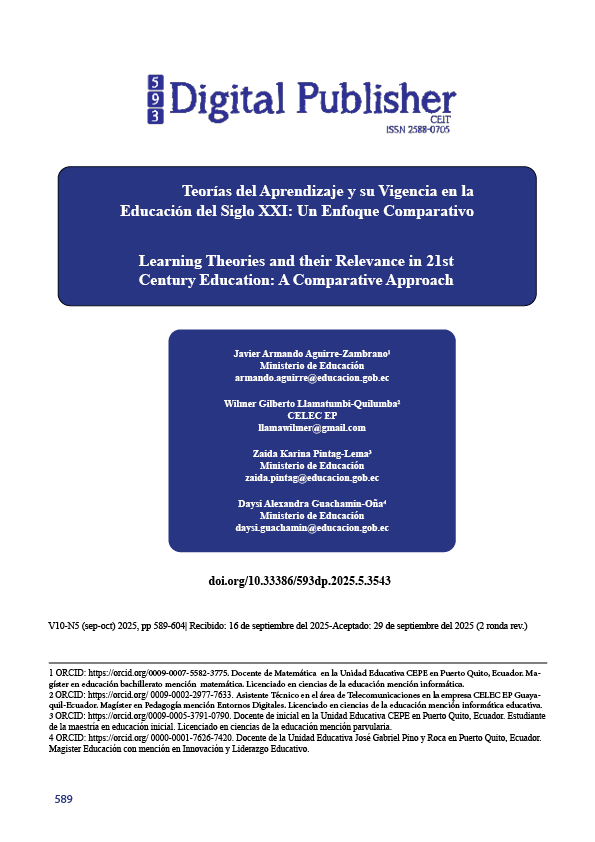Teorías del Aprendizaje y su Vigencia en la Educación del Siglo XXI: Un Enfoque Comparativo
Contenido principal del artículo
Resumen
En el siglo XXI, los rápidos cambios tecnológicos, sociales y culturales plantean nuevos desafíos educativos, lo que exige reexaminar las teorías del aprendizaje clásicas a la luz de las necesidades contemporáneas. Este artículo teórico realiza una revisión comparativa de las principales teorías del aprendizaje conductismo, cognitivismo, constructivismo, humanismo y conectivismo evaluando su vigencia en la educación actual. En la Introducción se contextualiza el problema, destacando cómo la globalización y la sociedad del conocimiento requieren enfoques pedagógicos actualizados. En el Desarrollo, se analizan en profundidad cada corriente teórica, sus fundamentos, aportes, críticas y debates, así como su relevancia en las prácticas educativas del siglo XXI. Se abordan tensiones conceptuales, como la dicotomía entre instrucción directa y aprendizaje por descubrimiento, la integración de tecnología digital en el aprendizaje, y la necesidad de enfoques centrados en el estudiante. Se concluye que todas las teorías aportan perspectivas complementarias, pero ninguna es por sí sola suficiente; por tanto, se aboga por un enfoque integrador y contextualizado. Se señalan las limitaciones del estudio teórico y se proponen líneas de investigación futuras, incluyendo la adaptación de las teorías a entornos educativos digitales y multiculturales. Este trabajo pretende contribuir a la discusión crítica sobre cómo las teorías del aprendizaje pueden orientar la innovación educativa en Ecuador y el mundo, favoreciendo una educación de calidad acorde con las demandas del siglo XXI.
Descargas
Detalles del artículo

Esta obra está bajo una licencia internacional Creative Commons Atribución-NoComercial-CompartirIgual 4.0.
1. Derechos de autor
Las obras que se publican en 593 Digital Publisher CEIT están sujetas a los siguientes términos:
1.1. 593 Digital Publisher CEIT, conserva los derechos patrimoniales (copyright) de las obras publicadas, favorece y permite la reutilización de las mismas bajo la licencia Licencia Creative Commons 4.0 de Reconocimiento-NoComercial-CompartirIgual 4.0, por lo cual se pueden copiar, usar, difundir, transmitir y exponer públicamente, siempre que:
1.1.a. Se cite la autoría y fuente original de su publicación (revista, editorial, URL).
1.1.b. No se usen para fines comerciales u onerosos.
1.1.c. Se mencione la existencia y especificaciones de esta licencia de uso.
Citas
Alberto, P. A., & Troutman, A. C. (2015). Applied behavior analysis for teachers (9na ed.). Upper Saddle River, NJ: Pearson.
Anderson, T. (2016). Theories for learning with emerging technologies. En G. Veletsianos (Ed.), Emergence and innovation in digital learning: Foundations and applications (pp. 35-64). Edmonton: Athabasca University Press.
Anderson, T., & Dron, J. (2011). Three generations of distance education pedagogy. The International Review of Research in Open and Distributed Learning, 12(3), 80-97.
Atkinson, R. C., & Shiffrin, R. M. (1968). Human memory: A proposed system and its control processes. In Psychology of learning and motivation (Vol. 2, pp. 89-195). Academic press.
Ausubel, D. (1968). Educational psychology: A cognitive view. Nueva York: Holt, Rinehart & Winston.
Baddeley, A. (1992). Working memory. Science, 255(5044), 556-559.
Ballesteros Carbajal, A. (2021). Necesidad de un enfoque humanista en el currículo de las ingenierías. En Memorias XVI Congreso Nacional de Investigación Educativa (pp. 1-6). Puebla, México.
Bandura, A. (1977). Social learning theory. Englewood Cliffs, NJ: Prentice Hall.
Bear, G. G. (2015). Preventive and classroom-based strategies. En E. Emmer & E. Sabornie (Eds.), Handbook of classroom management (pp. 15-39). Nueva York: Routledge.
Beckem, J. M., & Watkins, M. (2012). Bringing life to learning: Immersive experiential learning simulations for online and blended courses. Journal of Asynchronous Learning Networks, 16(5), 61-70.
Bell, F. (2011). Connectivism: Its place in theory-informed research and innovation in technology-enabled learning. International Review of Research in Open and Distributed Learning, 12(3), 98-118.
Bender, W. N. (2012). Project-based learning: Differentiating instruction for the 21st century. Thousand Oaks, CA: Corwin Press.
Bokova, I. (2015). Fighting Cultural Cleansing. Harvard International Review, 36(4).
Bruner, J. S. (1960). The process of education. Cambridge, MA: Harvard University Press.
Bruner, J. S. (1961). The act of discovery. Harvard Educational Review, 31(1), 21-32.
Bruner, J. S. (1985). Vygotsky: A historical and conceptual perspective. En J. V. Wertsch (Ed.), Culture, communication, and cognition: Vygotskian perspectives (pp. 21-34). Cambridge: Cambridge University Press.
Brown, J. S., Collins, A., & Duguid, P. (1989). Situated cognition and the culture of learning. Educational Researcher, 18(1), 32-42.
Clark, R. E., Kirschner, P. A., & Sweller, J. (2012). Putting students on the path to learning: The case for fully guided instruction. American Educator, 36(1), 6-11.
Clarà, M., & Barberà, E. (2014). Three problems with the connectivist conception of learning. Journal of Computer Assisted Learning, 30(3), 197-206.
Cobo, C., & Moravec, J. (2011). Aprendizaje invisible: Hacia una nueva ecología de la educación. Barcelona: Universidad de Barcelona / Col·lecció Transmedia XXI.
Deci, E., & Ryan, R. (2000). The “what” and “why” of goal pursuits: Human needs and the self-determination of behavior. Psychological Inquiry, 11(4), 227-268.
Delors, J. et al. (1996). La educación encierra un tesoro. Informe de la UNESCO de la Comisión Internacional sobre la Educación para el Siglo XXI. París: UNESCO.
Downes, S. (2012). Connectivism and connective knowledge: Essays on meaning and learning networks. Creative Commons eBook.
Egan, K. (2002). Getting it wrong from the beginning: Our progressivist inheritance from Herbert Spencer, John Dewey, and Jean Piaget. New Haven: Yale University Press.
Ertmer, P. A., & Newby, T. J. (2013). Behaviorism, cognitivism, constructivism: Comparing critical features from an instructional design perspective (Reprint from 1993). Performance Improvement Quarterly, 26(2), 43-71.
Eyre, D. (2016). High performance learning: How to become a world class school. Londres: Routledge.
Fernández, O., Luquez, P., & Leal, E. (2010). Procesos socio-afectivos asociados al aprendizaje. TELOS, Revista de Estudios Interdisciplinarios en Ciencias Sociales, 12(1), 63-78.
Freire, P. (1970). Pedagogía del oprimido. Montevideo: Tierra Nueva.
Freire, P. (1997). Pedagogy of the heart. Nueva York: Continuum.
García, O. F., & Ochoa, G. M. (2019). Empatía y neuroeducación: la clave para un aprendizaje significativo. Revista Complutense de Educación, 30(2), 535-550.
Goleman, D. (1995). Emotional intelligence. Nueva York: Bantam Books.
González Beade, I. (2023). El conductismo en la formación docente: una mirada crítica. Revista Iberoamericana de Investigación en Educación, (7), 63-72. https://doi.org/10.58663/riied.vi7.95
Guerrero, C. (2019). Creencias docentes sobre teorías de aprendizaje en profesores de educación básica. Revista Colombiana de Educación, 76, 319-342.
Hmelo-Silver, C. E., Duncan, R. G., & Chinn, C. A. (2007). Scaffolding and achievement in problem-based and inquiry learning: A response to Kirschner, Sweller, and Clark. Educational Psychologist, 42(2), 99-107.
Holmes, W., Bialik, M., & Fadel, C. (2019). Artificial intelligence in education: Promises and implications for teaching and learning. Boston: Center for Curriculum Redesign.
Jonassen, D. H. (1991). Objectivism vs. constructivism: Do we need a new philosophical paradigm? Educational Technology Research and Development, 39(3), 5-14.
Kirschner, P. A., Sweller, J., & Clark, R. E. (2006). Why minimal guidance during instruction does not work: An analysis of the failure of constructivist, discovery, problem-based, experiential, and inquiry-based learning. Educational Psychologist, 41(2), 75-86.
Kop, R. (2011). The challenges to connectivist learning on open online networks: Learning experiences during a massive open online course. International Review of Research in Open and Distributed Learning, 12(3), 19-38.
Kop, R., & Hill, A. (2008). Connectivism: Learning theory of the future or vestige of the past? International Review of Research in Open and Distance Learning, 9(3), 1-13.
Kropf, D. C. (2013). Connectivism: 21st century’s new learning theory. European Journal of Open, Distance and E-Learning, 16(2), 13-24.
Lave, J., & Wenger, E. (1991). Situated learning: Legitimate peripheral participation. Cambridge: Cambridge University Press.
Landers, R. N. (2014). Developing a theory of gamified learning: Linking serious games and gamification of learning. Simulation & Gaming, 45(6), 752-768.
Limongi Izaguirre, M. C. (2017). Métodos conductistas en la escuela del siglo XXI. [Documento de tesis de grado, Universidad de Especialidades Espíritu Santo, Ecuador]. Repositorio UEES.
Lozano, J. F. (2019). Educación intercultural y teorías de aprendizaje: una revisión crítica desde Abya Yala. Revista Latinoamericana de Educación Intercultural, 3(1), 45-60.
Mackness, J., & Bell, F. (2015). Rhizo14: A rhizomatic learning cMOOC in sunlight and in shade. Open Praxis, 7(1), 25-38.
Maritain, J. (1943). Education at the crossroads. New Haven: Yale University Press. (Ed. esp. La educación en tiempos críticos).
Martínez, G. A. (2017). Educación a la luz del Humanismo Cristiano. Frater, Revista de Estudios Aplicados, 1, 11-17.
Maslow, A. (1970). Motivation and personality (2da ed.). Nueva York: Harper & Row.
Maslow, A. (1972). El hombre autorrealizado. Barcelona: Kairós.
Mattar, J. (2018). Constructivism and connectivism in education technology: Active, situated, authentic, experiential, and anchored learning. RIED. Revista Iberoamericana de Educación a Distancia, 21(2), 201-217. https://doi.org/10.5944/ried.21.2.20055
Mayer, R. E. (2004). Should there be a three-strikes rule against pure discovery learning? The case for guided methods of instruction. American Psychologist, 59(1), 14-19.
Mayer, R. E. (2020). Multimedia learning (3ra ed.). Cambridge: Cambridge University Press.
Meller, P. (2018). Claves para la educación del futuro: Creatividad y pensamiento crítico. Barcelona: Plataforma Editorial.
Ministerio de Educación del Ecuador. (2016). Currículo de Educación General Básica y Bachillerato 2016. Quito: Subsecretaría de Fundamentos Educativos.
Miralbell, I. (2023). Aportes de la filosofía y la psicología humanista para la educación en el ser. Revista de Filosofía UCSC, 22(2), 95-112. https://doi.org/10.21703/2735-6353.2023.22.2.2102
Montessori, M. (1967). The absorbent mind. Nueva York: Holt, Rinehart & Winston.
NASEM National Academies of Sciences, Engineering, and Medicine. (2018). How People Learn II: Learners, contexts, and cultures. Washington, DC: National Academies Press.
OECD Organisation for Economic Co-operation and Development. (2018). The future of education and skills: Education 2030. Paris: OECD Publishing.
Phillips, D. C. (1995). The good, the bad, and the ugly: The many faces of constructivism. Educational Researcher, 24(7), 5-12.
Piaget, J. (1970). La equilibración de las estructuras cognitivas. Buenos Aires: Siglo XXI.
Pozo, J. I. (2014). Aprendices y maestros: La psicología cognitiva del aprendizaje. Madrid: Alianza Editorial.
Prince, M., & Felder, R. (2006). Inductive teaching and learning methods: Definitions, comparisons, and research bases. Journal of Engineering Education, 95(2), 123-138.
Reeves, T. C., Herrington, J., & Oliver, R. (2002). Authentic activities and online learning. En Proceedings of HERDSA 2002: Quality Conversations (pp. 562-567). Perth, Australia.
Richelle, M. (2011). ¿Qué ha sido del conductismo en el siglo XXI? Anuario de Psicología, 42(3), 545-556. (Trad. del francés).
Rogers, C. (1961). On becoming a person. Boston: Houghton Mifflin. (Trad. esp. El proceso de convertirse en persona).
Rogers, C. (1969). Freedom to learn. Columbus, OH: Merrill. (Trad. esp. Libertad y creatividad en la educación).
Rubio Gaviria, D. A., & Jiménez Guevara, J. E. (2021). Constructivismo y tecnologías en educación: entre la innovación y el aprender a aprender. Historia de la Educación Latinoamericana, 23(36), 61-92. https://doi.org/10.19053/01227238.12854
Schunk, D. H. (2012). Learning theories: An educational perspective (6ta ed.). Boston: Pearson.
Scott, C. L. (2015). The futures of learning 3: What kind of pedagogies for the 21st century? (ERF Working Papers Series, No. 15). París: UNESCO.
Siemens, G. (2004). Connectivism: A theory for the digital age. elearnspace. Recuperado de http://www.elearnspace.org/Articles/connectivism.htm
Siemens, G. (2005). Connectivism: Learning as network-creation. ASTD Learning News, 10(1).
Siemens, G. (2008). Learning and knowing in networks: Changing roles for educators and designers. ITFORUM, Paper 105. University of Georgia.
Siemens, G. (2011). Moving beyond self-directed learning: Network-directed learning. Connectivism blog. Recuperado de http://www.connectivism.ca/?p=307
Siemens, G. (2012). MOOCs are really a platform. elearnspace blog. Recuperado de http://www.elearnspace.org/blog/2012/07/25/moocs-are-really-a-platform/
Siemens, G., & Long, P. (2011). Penetrating the fog: Analytics in learning and education. EDUCAUSE Review, 46(5), 30-32.
Skinner, B. F. (1954). The science of learning and the art of teaching. Harvard Educational Review, 24(2), 86-97.
Skinner, B. F. (1971). Beyond freedom and dignity. Nueva York: Alfred A. Knopf.
Sweller, J., van Merriënboer, J., & Paas, F. (2019). Cognitive architecture and instructional design: 20 years later. Educational Psychology Review, 31(2), 261-292.
Tokuhama-Espinosa, T. (2019). Neuromyths: Debunking false ideas about the brain. Nueva York: W. W. Norton.
UNESCO. (2015). Rethinking education: Towards a global common good? París: UNESCO Publishing.
UNESCO. (2021). Reimaginar juntos nuestros futuros: Un nuevo contrato social para la educación. París: UNESCO.
von Glasersfeld, E. (1995). Radical constructivism: A way of knowing and learning. Londres: Falmer Press.
Vygotsky, L. S. (1978). Mind in society: The development of higher psychological processes. Cambridge, MA: Harvard University Press.
Watson, J. B. (1913). Psychology as the behaviorist views it. Psychological Review, 20(2), 158-177.
Zawacki-Richter, O., et al. (2019). Systematic review of research on artificial intelligence applications in higher education where are the educators? International Journal of Educational Technology in Higher Education, 16(39), 1-27.





